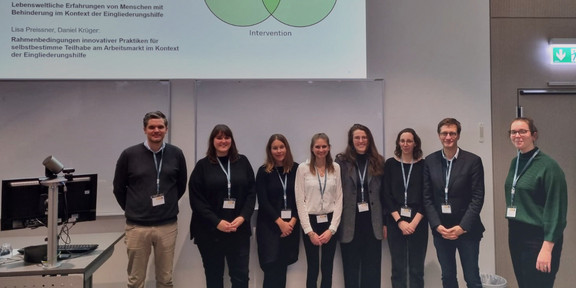2023
Cross-faculty research group "Innovation of Inclusion" presents research results at conference

On 23th November 2023, seven researchers from TU Dortmund University and two from Münster University of Applied Sciences and Arts came together at the Community Health Conference in Bochum as part of a dedicated focus session. They presented current research results on different perspectives on social innovation for more social participation of people with disabilities. The focus was on participation in science and participation in the primary labour market.
From 23th to 24th November, the 6th Community Health Conference took place at the Bochum Hochschule für Gesundheit University of Applied Science. In this context, seven scientists from TU Dortmund University and two from Münster University of Applied Sciences and Arts came together in a special focus session entitled "Innovation der Teilhabe" (innovation of inclusion), which was very well attended with around 60 participants from science and practice. From different perspectives, they discussed socially innovative approaches aimed at improving the participation opportunities of people with disabilities. The researchers are part of a working group sharing the title of the session (https://sfs.sowi.tu-dortmund.de/forschung/projekte/innovation-der-inklusion/) and presented three current projects under the supervision of Bastian Pelka.
After an introduction by Daniel Krüger (TU Dortmund University, Faculty of Social Sciences, Social Research Centre), Deputy Professor PD Dr Bastian Pelka (Faculty of Rehabilitation Sciences) and Ann Christin Schulz (Social Research Centre) continued with their presentation about the the IncluScience project (https://incluscience.org/), in which people with disabilities are researching the accessibility of places together with scientists from the Social Research Centre and activists from Sozialhelden e.V. They initiated a lively discussion on the question of how participation in science can succeed in the context of citizen science.
Dr Jana York, Teresa Sartor and Sarah Lamb (Faculty of Rehabilitation Sciences) followed with a presentation on the evaluation of the Points of Contact for Employers (Einheitliche Ansprechstellen für Arbeitgeber*innen, EAA) (https://soziologie.reha.tu-dortmund.de/forschung/projekte/aktuelle-projekte/). With this presentation they summarized how they are studying these EAAs as part of the EvaEfA project at the Faculty of Rehabilitation Sciences at TU Dortmund University as social innovations in the vocational rehabilitation system. A special focus of this research is the analysis of factors for success and failure. The presentation also focused on the mixed methods approach used in the project.
After a further round of questions from the audience and impulses for further research into EAAs and their future development and significance, two further presentations followed with a focus on the participation of people with disabilities in work. Nora Karl and Mara Vöcking from the Münster School of Design (Münster University of Applied Sciences) and Lisa Preissner and Daniel Krüger (Social Research Centre) presented initial results from the project "Arbeiten, wie ich es will!" (Work. The way I want it!, AWIEW) from different perspectives (https://www.arbeiten-wie-ich-es-will.de/). This transdisciplinary project focuses on the participatory design and testing of new approaches for pathways into the primary labour market for people with disabilities. The efforts are complemented with an AI-based needs assessment tool as part of a living lab. The co-design of socially innovative practices is studied by the teams at Münster University of Applied Sciences and the Social Research Centre by researching framework conditions at the individual and institutional level as well as with regard to environmental factors. Examples for these factors are provided by the effects of legal regulations or prevailing values and norms. The research is aimed at the support of the successful establishment and dissemination of new practices for more participation of people with disabilities in the primary labour market. In this context, the focus is on their needs, wishes and experiences. Furthermore, employees of a laege welfare organisation and possible future employers are interviewed as experts. The initial research results from the project, which were presented during the conference, already offered numerous implications for further research and practice with regard to inhibiting and promoting factors. The event concluded with a discussion round, which provided plenty of new impetus for research and practice.
Link to the conference website: https://www.hs-gesundheit.de/chkbochum
Link to the AWIEW project: https://www.arbeiten-wie-ich-es-will.de/
Link to the EvaEfA project: https://www.lvr.de/de/nav_main/soziales_1/inklusionsamt/wir_ueber_uns/aktuelles_12/forschungsvorhaben/forschungsvorhaben.jsp#section-4056151 und https://soziologie.reha.tu-dortmund.de/forschung/projekte/aktuelle-projekte/
Link to the IncluScience project: https://incluscience.org/
Link to the working group: https://sfs.sowi.tu-dortmund.de/forschung/projekte/innovation-der-inklusion/




![[Translate to English:] [Translate to English:]](/storages/zentraler_bilderpool/_processed_/a/f/csm_Kontakt_b86e8d8ecc.png)
![[Translate to English:] [Translate to English:]](/storages/sfs-sowi/_processed_/7/e/csm_header_collage_sfs_eving_sozialforschungsstelle_dortmund_31bd3c09fb.jpg)